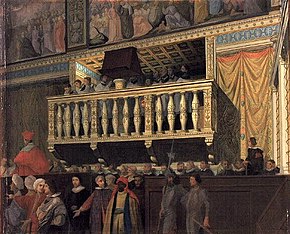
Back Sbor Sixtinské kaple Czech Päpstlicher Chor der Sixtinischen Kapelle German Sixtuse kapell Estonian Chœur de la chapelle Sixtine French Paduan Suara Kapel Sistina ID Cappella musicale pontificia sistina Italian Capella Musica Pontificalis Sixtina Latin Koor van de Sixtijnse kapel Dutch Pontifícia Capela Musical Sistina Portuguese Папская капелла Russian

The Sistine Chapel Choir, as it is generally called in English, or officially the Coro della Cappella Musicale Pontificia Sistina in Italian, is the Pope's personal choir. It performs at papal functions in the Sistine Chapel and in any other church in Rome where the Pope is officiating, including St. Peter's Basilica. One of the oldest choirs in the world, it was constituted as the Pope's personal choir by Pope Sixtus IV (from whom both the choir and the chapel in which it performs take their names). Although it was established in the late 15th century, its roots go back to the 4th century and the reign of Pope Sylvester I.
The choir's composition and numbers have fluctuated over the centuries. However, the modern choir comprises twenty men (tenors and basses) and thirty boys (sopranos and altos). The men's choir (Cantori) is composed of professional singers. The members of the boys choir (Pueri Cantores) are not paid when performing at papal functions, but receive a free education at their own school in Rome, known as the Schola Puerorum. Since the late 20th century, in addition to its papal duties, the choir has undertaken international tours, participated in radio and television broadcasts, and recorded for Deutsche Grammophon.